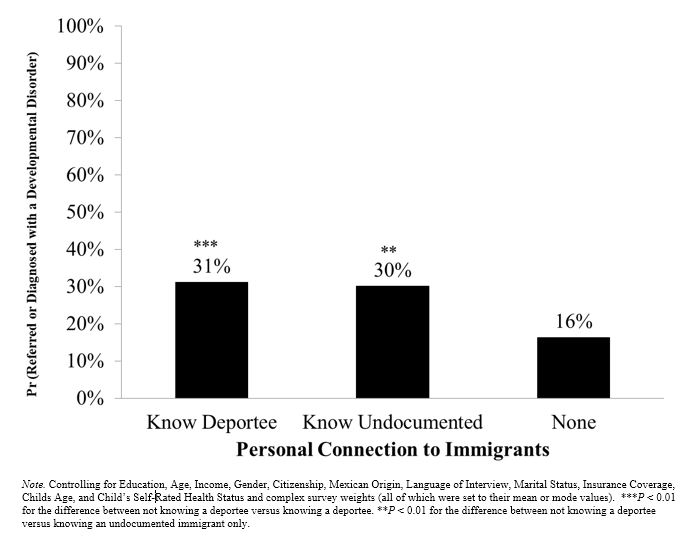By Edward D. Vargas And Viridiana L. Benitez
The first half of President Trump’s administration has seen an increase in immigration raids and detainment of immigrants with no criminal backgrounds. This has included recent attacks on organizers and immigration activists who have opposed immigration detention.
This anti-immigrant sentiment is creating stress for immigrants and spilling over to non-immigrant Latinos and their U.S.-born children, ultimately leading to negative health outcomes. In our paper, recently published in the Journal of Community Psychology, we examine how personally knowing someone who has been deported can negatively impact children’s referral/diagnoses with a developmental disorder.
Using nationally representative data from the Latino National Health and Immigration Survey (LNHIS, (n=548) funded by the RWJF Center for Health Policy at the University of New Mexico and implemented by Latino Decisions, we examine the relationship between Latino’s parent’s personal connections to immigrants and their children’s developmental health. Our findings show that respondents who know a deportee are 2.4 times more likely to report that their child has been referred or diagnosed with a developmental disorder. Additionally, knowing more deportees and having a closer family tie with deportees is statistically associated with developmental problems. We believe this research adds to the emerging research on stress and child health by examining the intersections of immigration policy, mental health, and child development. Given the length of time immigrants are now living in the U.S. without a pathway to citizenship, we can only expect this trend to increase and have detrimental impacts on overall Latina/o health.


Figure 1: Adjusted Predicted Probabilities of Logistic Regression Model of Latinos’ Personal Connections to Immigrants on Children’s Referral and Diagnoses of a Developmental Disorder: 2015 Latino National Health and Immigration Survey (n=548).
Our work shows that personally having a connection to either a deported or undocumented immigrant is affecting Latino children’s health more broadly, not just Latino immigrants who are the targets of federal and state immigrant policies. Our findings suggest that the probability of reporting developmental disorders is 31 percent if a respondent personally knows someone who has been deported. In other words, Latinos who personally know someone who has been detained or deported are 2.4 times more likely to report that their child has been referred or diagnosed with a developmental disorder compared to Latinos parents who do not personally know someone who has been deported. We also find that Latino parents who personally know someone who is undocumented are 2.27 times more likely to report that their child has been referred or diagnosed with a developmental disorder compared to Latinos’ who do not personally know someone who is undocumented or deported.
We also find that the number of deportees and the relationship to this deportee increases the probability of reporting poor developmental health for their child. In fact, if respondents personally know there or more deportees as opposed to not knowing any deportees increases the likelihood of their child being referred or diagnosed with a developmental disorder by a factor of 4.5. Moreover, if the known deportee is a relative compared to a friend, the likelihood of the child being referred or diagnosed with a developmental disorder increases by a factor of 2.9. Lastly, if the deportee is the main breadwinner and a family member, the likelihood of the child being referred or diagnosed with a developmental disorder increases by a factor of 3.9. This provides strong evidence that there is a cumulative effect, where stronger connections with the deported population, reflected in multiple relationships, yield more harmful effects. In sum, parents’ connections to undocumented individuals and individuals who have been deported may increase stressors felt at the individual, parental, and familial levels, disrupting typical child development, and increasing the risk of developmental disorders.
The United States is undergoing a nearly unprecedented period of heightened immigrant policy activity that has a marked punitive and anti-Hispanic undertone. Latinos are acutely aware of these laws, with the majority of respondents in this survey indicating that the laws in their state are unfavorable to immigrants. Our research findings suggest that personally knowing a deportee is leading to poor developmental health outcomes for US born children. As the Trump administration targets immigrants, it is vital that we create policies that promote health and wellness among all communities. Currently, it is estimated that one-fourth of U.S.-born Latino children have at least one parent who is non-citizen. Our recommendation is for state and local policy-makers to create innovative and welcoming policies that promote health and educational training and not pass policies that disrupt American families.
***
Edward D. Vargas, Ph.D., MPH. Senior Analyst, Latino Decisions, and School of Transborder Studies, Arizona State University, School of Transborder Studies, Interdisciplinary B, Room 165, Tempe, AZ 85287, USA.
Viridiana L. Benitez, PhD. Department of Psychology, Arizona State University, PSYCH 249 Tempe, AZ 85287-6303.


